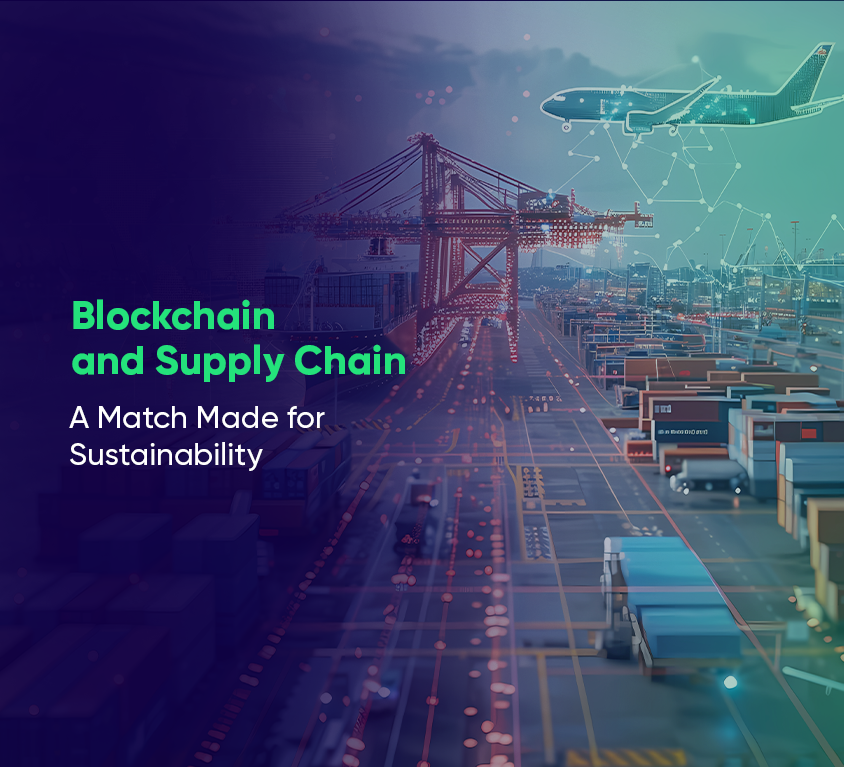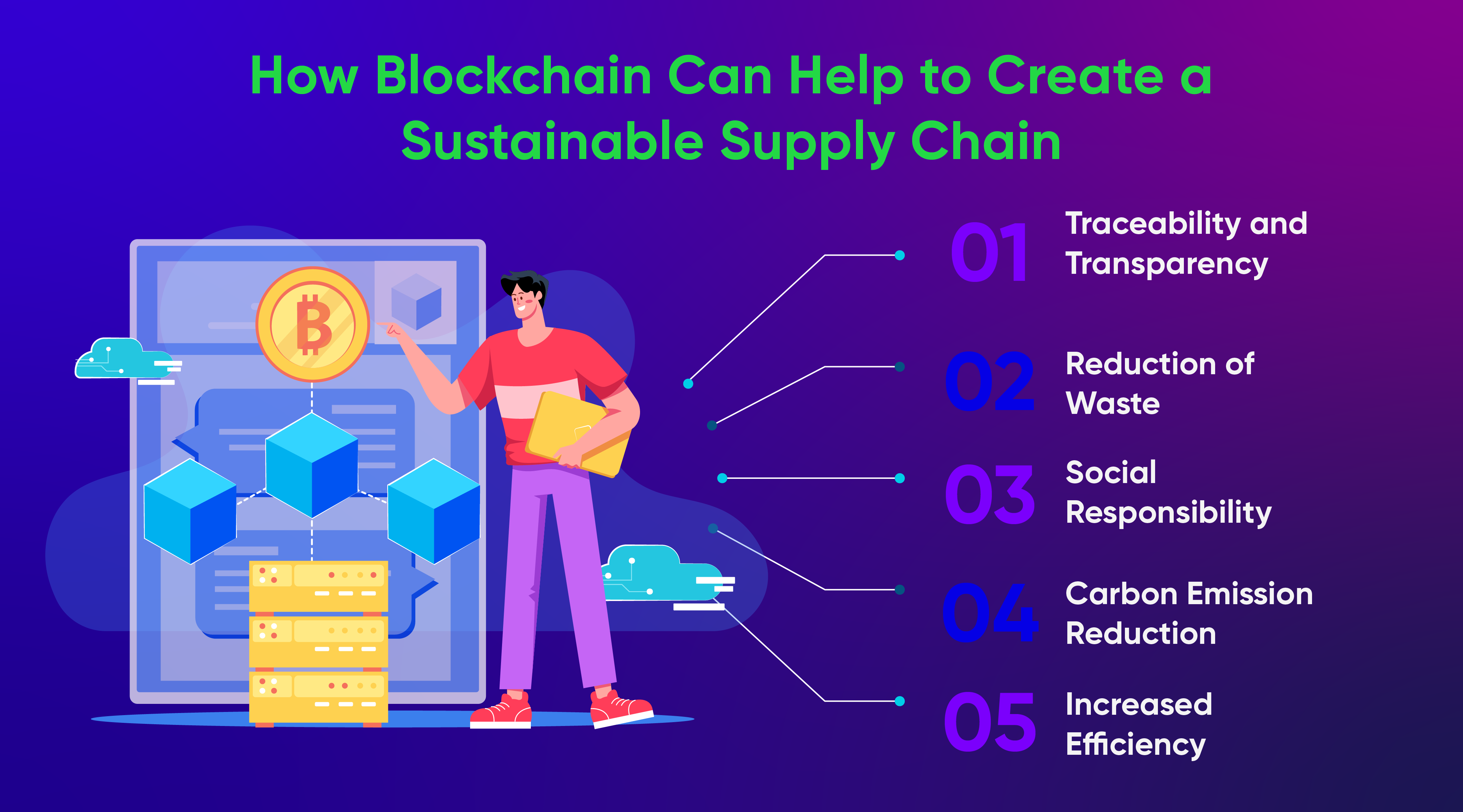
Introduction
Web3 & Blockchain Consultancy :
Blockchain and Supply Chain: A Match Made for Sustainability
Originally designed for cryptocurrencies, Blockchain technology has expanded its reach into various sectors, including supply chain management. It has become an invaluable resource for organizations aiming to enhance sustainability within their supply chains. By adopting Blockchain, companies adopt a strategic method that not only aligns with environmental and social goals but also enhances their brand image and secures the long-term stability of their operations. Blockchain solutions in supply chains significantly reduce the obstacles to achieving sustainability. In this blog, we will explore why blockchain is regarded as a crucial tool in developing sustainable supply chains.Key Takeaways
- What is Supply Chain Sustainability? Supply chain sustainability focuses on minimizing the environmental and social impacts of supply chain operations to achieve long-term economic success.
- Blockchain & Supply Chain Blockchain technology enhances supply chain transparency and accountability, ensuring every product’s journey is traceable and sustainable.
- Benefits of Sustainability Sustainable practices improve brand reputation, meet consumer demands for ethical products, and ensure regulatory compliance.
- Barriers Challenges include high initial costs, complex implementation of sustainable practices, and difficulty accurately measuring the impact.
What is a Sustainable Supply Chain?
A sustainable supply chain, often called a green supply chain, involves adopting environmentally and socially responsible methods throughout the entire process, from procuring materials to delivering the final product. This approach focuses on actions that reduce the adverse effects of supply chain activities on the environment and society, aiming to secure long-term economic stability for companies.Real-Life Example of a Sustainable Supply Chain
Take Nestle, the world’s largest and most diverse food and beverage company, for example. They launched the Nestlé Cocoa Plan in their cocoa supply chain. This initiative collaborates with local communities in West Africa to enhance the lives of farmers, promote sustainable farming techniques, and combat child labor risks. Through this program, Nestle not only raised the quality of their cocoa but also showcased an excellent model of sustainable practices in action.Why is a Sustainable Supply Chain Important?
Here are some key reasons why sustainable supply chains are crucial:- Environmental Impact: Research from the CDP indicates that supply chains generate emissions that are 5.5 times greater than a company’s direct emissions. This underscores the necessity for sustainable supply chain practices.
- Consumer Demand: By maintaining a sustainable supply chain, businesses can appeal to consumers who prioritize environmental and social responsibility. This can boost their sales and enhance their brand reputation.
- Competitive Advantage: Firms that adhere to responsible practices often outperform their competitors, gaining a competitive edge in the market.
- Social Impact: A report by the International Labour Organization notes that 27.6 million people worldwide are subjected to forced labor, many within supply chains. This emphasizes the importance for businesses to foster ethical labor practices within their supply chains.
Barriers to a Sustainable Supply Chain
Organizations face several significant challenges when trying to implement sustainability across their supply chain:- Insight into Product Provenance: The supply chain process is intricate, involving multiple stages of product handling, which complicates the assurance of responsible sourcing and compliance with ESG (Environmental, Social, and Governance) standards.
- Data Accessibility: The scattered nature of data within traditional supply chain systems poses difficulties for stakeholders trying to enact sustainable practices.
- Inventory Visibility: A lack of comprehensive inventory data can lead to excessive ordering. This not only raises costs but also increases waste and greenhouse gas emissions.
- High Customer Expectations: In the modern, fast-paced consumer market, customers often expect immediate order fulfillment. This demand can pressure companies into adopting less eco-friendly logistics, packaging, and transportation methods.
How Blockchain Can Help Create a Sustainable Supply Chain
Blockchain technology can be used to support sustainable businesses and to attain transparency, traceability, as well as accountability. Here’s how Blockchain can aid in achieving sustainability goals:
-
Traceability and Transparency
Blockchain provides comprehensive visibility throughout the supply chain, allowing businesses to monitor a product from its origin to its final destination. This critical capability helps pinpoint system inefficiencies and ensures compliance with ESG (Environmental, Social, and Governance) standards.
-
Reduction of Waste
Blockchain enhances sustainability by helping businesses minimize waste. It offers immediate insights into inventory levels, enabling production based on actual demand. This control can prevent overproduction, reducing both costs and environmental impacts.
-
Social Responsibility
Blockchain enhances social responsibility across the supply chain. Its heightened transparency allows network participants to monitor labor conditions, ensuring fair and timely wages for workers. Utilizing Blockchain is an effective strategy to uphold ethical labor standards and prevent exploitation.
-
Carbon Emission Reduction
Blockchain allows companies to monitor the carbon emissions associated with their products throughout the supply chain. This visibility helps identify opportunities to cut emissions, such as optimizing transportation routes or using sustainable packaging materials.
-
Increased Efficiency
Blockchain provides real-time updates on inventory and transactions, which helps companies cut costs, improve lead times, and ensure prompt delivery to customers. Employing Blockchain for sustainable supply chain management is advisable for achieving optimal efficiency.